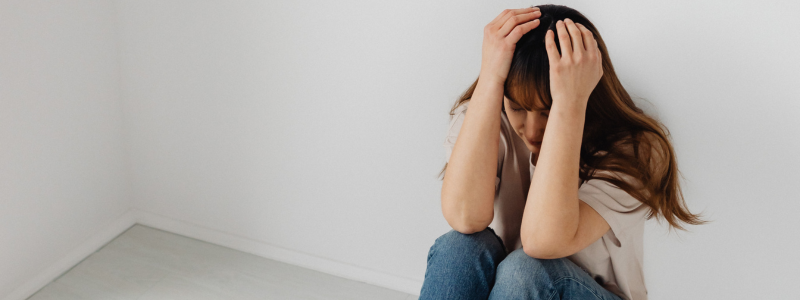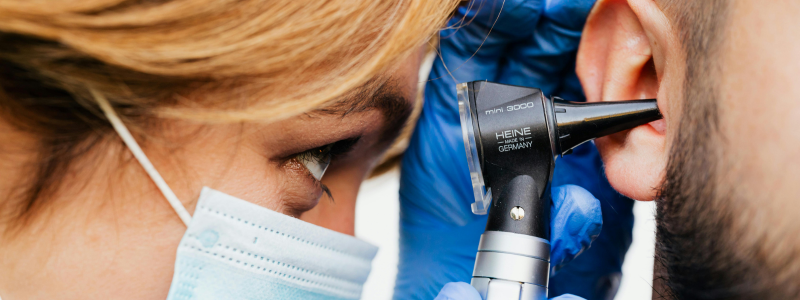
Head of Online Medical Content

Audiology Expert

Ototoxicity and Hearing Loss
Symptoms, Causes & Treatment
Overview | What is ototoxic hearing loss? | Symptoms | Treatments | How to prevent | Conclusion
Last Hearing Aid UK Update:
Otoocervicity and hearing loss overview
Ototoxicity refers to the harmful effects of certain medications or chemicals on hearing and balance. Common culprits include certain antibiotics, chemotherapy drugs, and high doses of aspirin.
Symptoms may include hearing loss, tinnitus, or dizziness. Monitoring medication use and consulting with healthcare providers can help prevent or minimise ototoxicity-related hearing loss. This article discusses the causes, symptoms, and treatment of ototoxicity.
What is ototoxic hearing loss?
Ototoxicity refers to the toxic effects that certain drugs, chemicals, and substances can have on the auditory system. This is especially true for the cochlea, vestibular system, and auditory nerve. These substances can cause temporary or permanent hearing loss, tinnitus, and balance problems.
Ototoxicity is a serious issue that affects many individuals, including those who are being treated with certain medications, are exposed to chemicals in the workplace, or are regularly exposed to loud noises.
Drugs - Ototoxic hearing loss causes
How do ototoxic drugs cause hearing loss? One of the most common causes of ototoxicity is the use of certain medications, including aminoglycoside antibiotics, loop diuretics, and chemotherapy drugs. These medications can damage the hair cells and nerve fibres in the inner ear, leading to hearing loss and tinnitus.
If we look at antibiotics associated with ototoxicity and hearing loss, aminoglycoside antibiotics are often used to treat bacterial infections, but they can cause permanent hearing loss if used for an extended period of time or in high doses.
Loop diuretics, which are used to treat conditions such as heart failure and kidney disease, can also cause hearing loss and tinnitus, particularly when given intravenously.
Other ototoxic hearing loss examples include Chemotherapy drugs, such as cisplatin, which can also cause ototoxicity, which can be temporary or permanent, depending on the dosage and duration of treatment.
These drugs are used to treat various types of cancer, and while they are highly effective in killing cancer cells, they can also damage the hair cells and nerve fibres in the inner ear. This can lead to hearing loss, tinnitus, and balance problems, which can have a significant impact on a patient's quality of life.
Chemicals - Ototoxic hearing loss causes
In addition to medications, exposure to certain chemicals and substances in the workplace can also cause ototoxicity. Individuals who work in industries such as construction, manufacturing, and agriculture may be exposed to chemicals such as solvents, heavy metals, and pesticides. These can damage the inner ear and lead to hearing loss and tinnitus.
Related reading: Tinnitus hearing aids
Ototoxicity and noise-induced hearing loss
Similarly, individuals who work in noisy environments, such as factories and airports, are at risk of developing noise-induced hearing loss, which is caused by exposure to loud noises over a prolonged period of time.

Ototoxicity and Hearing Loss
How does ototoxicity cause hearing loss?
Symptoms of ototoxicity
The symptoms of ototoxicity can vary depending on the severity and duration of the exposure. Some individuals may experience a temporary loss of hearing or ringing in the ears, while others may experience more severe symptoms, such as permanent hearing loss and balance problems.
In some cases, the symptoms may not be noticeable until years after the exposure has occurred.
Ototoxic hearing loss treatment
Treatment for ototoxicity depends on the underlying cause and severity of the symptoms. Does ototoxicity go away? In some cases, the symptoms may resolve on their own once the exposure has stopped.
However, if the hearing loss is permanent or severe, hearing aids or cochlear implants may be necessary to improve the patient's hearing. Balance therapy may also be recommended for individuals who experience balance problems as a result of ototoxicity.
Related reading: Hearing aids vs cochlear implants
Preventing hearing loss caused by chemical (ototoxicity) and noise exposure
Is ototoxic hearing loss reversible? Preventing ototoxicity is essential, particularly for individuals who are at high risk of developing hearing loss due to medication or chemical exposure.
Patients who are being treated with medications that have the potential to cause ototoxicity should be closely monitored by their healthcare provider and have their hearing tested regularly.
Individuals who work in noisy environments or are exposed to chemicals should wear protective gear, such as earplugs and earmuffs, to reduce their risk of developing hearing loss.
In conclusion
Ototoxicity is a serious condition that can cause temporary or permanent hearing loss, tinnitus, and balance problems. It can be caused by medications, chemicals, and loud noises, and can have a significant impact on a patient's quality of life.
Treatment for ototoxicity depends on the underlying cause and severity of the symptoms, and prevention is key to avoiding this condition. Patients should be closely monitored by their healthcare providers and take steps to protect their hearing in order to reduce their risk of Ototoxicity hearing loss.
However, it is important to know that if you take any medication discussed in this article (or others associated with hearing loss), it doesn't necessarily mean you will lose your hearing. Each individual responds to medication differently; therefore, the side effects can vary.
Always chat with your GP about your concerns and the risks of hearing loss from the particular medication you are being prescribed, especially if it's for a long period of time.
Why Choose Us?
- FREE Hearing Tests
- Best Hearing Aids and Prices
- FREE Aftercare for Life
- FREE Home Visits
- 200+ Local Audiologists
- 60 Day Money Back Guarantee
Think your hearing has changed? We can support you locally
If you feel like your hearing has worsened, we advise that you check how well you're hearing with an audiologist as soon as you can.
For any support, advice or hearing healthcare enquiries, please call us free on 0800 567 7621
Read Next:
Other hearing loss awareness articles you might like...
 Hearing aid stigma
Hearing aid stigma  How to tell if hearing loss is permanent or temporary
How to tell if hearing loss is permanent or temporary  Ways to keep your ears healthy
Ways to keep your ears healthy What's included in our hearing aid prices?
Our specialist service includes:
Do not spend hundreds of pounds without getting a second opinion from us.
Please call us on 0800 567 7621
 Not only are the prices great, but the service is fantastic! Many thanks to your team.
Not only are the prices great, but the service is fantastic! Many thanks to your team.Common FAQs about hearing aids and hearing loss
In general, any audiologist will always recommend to you the hearing aid model that best suits your needs. Here is a useful checklist to make sure that is the case.
- Audiologist's level of knowledge: The audiologist you have seen will hopefully have a wide knowledge of all available hearing aids; however, some will only be familiar with a small number of brands and, therefore, may not really be in a position to know which model is the best for you. It is OK to challenge their recommendation and ask them to justify why this particular brand is the one for you.
- Do research: Read about the hearing aid that was recommended. Does it seem like it will suit your lifestyle? Does it have more or fewer features than you need?
- Be aware of sales targets: Many high street retailers have specific tie-ins to a particular manufacturer/brand. The hearing aid they have suggested may still be the correct one for you, but do your research so that you know why they might have recommended it.
If you have significant hearing loss in both ears, you should be wearing two hearing aids. Here are the audiological reasons why:
Localisation: The brain decodes information from both ears and compares and contrasts them. By analysing the minuscule time delays as well as the difference in the loudness of each sound reaching the ears, the person is able to accurately locate a sound source.
Simply put, if you have better hearing on one side than the other, you can't accurately tell what direction sounds are coming from.
Less amplification is required: A phenomenon known as “binaural summation” means that the hearing aids can be set at a lower and more natural volume setting than if you wore only one hearing aid.
Head shadow effect: High frequencies, the part of your hearing that gives clarity and meaning to speech sounds, cannot bend around your head. Only low frequencies can. Therefore, if someone is talking on your unaided side, you are likely to hear that they are speaking, but be unable to tell what they have said.
Noise reduction: The brain has its own built-in noise reduction, which is only really effective when it is receiving information from both ears. If only one ear is aided, even with the best hearing aid in the world, it will be difficult for you to hear in background noise as your brain is trying to retain all of the sounds (including background noise) rather than filtering them out.
Sound quality: We are designed to hear in stereo. Only hearing from one side sounds a lot less natural to us.
Fancy some further reading on this topic? You can read about why two hearing aids are better than one in our article, hearing aids for Both Ears, here
For most people, the main benefit of a rechargeable hearing aid is simple convenience. We are used to plugging in our phones and other devices overnight for them to charge up. Here are some other pros and cons:
For anybody with poor dexterity or issues with their fingers, having a rechargeable aid makes a huge difference, as normal hearing aid batteries are quite small and some people find them fiddly to change.
One downside is that if you forget to charge your hearing aid, then it is a problem that can't be instantly fixed. For most, a 30-minute charge will get you at least two or three hours of hearing, but if you are the type of person who is likely to forget to plug them in regularly, then you're probably better off with standard batteries.
Rechargeable aids are also a little bit bigger and are only available in Behind-the-Ear models.
Finally, just like with a mobile phone, the amount of charge you get on day one is not going to be the same as you get a few years down the line. Be sure to ask what the policy is with the manufacturer's warranty when it comes to replacing the battery.
For most people, the answer is yes. But it's never that simple.
The majority of hearing problems affect the high frequencies a lot more than the low ones. Therefore, open fitting hearing aids sound a lot more natural and ones that block your ears up can make your own voice sound like you are talking with your head in a bucket. Therefore, in-ear aids tend to be less natural.
However, the true answer is we can't tell until we have had a look in your ears to assess the size of your ear canal, and until we have tested your hearing to see which frequencies are being affected.
People with wider ear canals tend to have more flexibility, also there are open fitting modular CIC hearing aids now that do not block your ears.
There is also the age-old rule to consider, that a hearing aid will not help you if it's sat in the drawer gathering dust. If the only hearing aid you would be happy wearing is one that people can't see, then that's what you should get.
Most people can adapt to any type of hearing aid, as long as they know what to expect. Have an honest conversation with your audiologist as to what your needs are.
Generally speaking, six or more. Unless it's none at all. The number of channels a hearing aid has is often a simplistic way an audiologist will use to explain why one hearing aid is better than another, but channels are complex, and it is really not that straightforward. Here are some reasons why:
Hearing aids amplify sounds of different frequencies by different amounts. Most people have lost more high frequencies than low, and therefore need more amplification in the high frequencies. The range of sounds you hear is split into frequency bands or channels, and the hearing aids are set to provide the right amount of hearing at each frequency level.
Less than six channels, and this cannot be done with much accuracy, so six is the magic number. However, a six-channel aid is typically very basic with few other features and is suitable only for hearing a single speaker in a quiet room. The number of channels is not what you should be looking at; it's more the rest of the technology that comes with them.
As a final note, different manufacturers have different approaches. One method is not necessarily better than any other. For example, some manufacturers have as many as 64 channels in their top aids. Most tend to have between 17 and 20. One manufacturer has no channels at all.
Manufacturer's warranties typically last between 2-5 years, depending on the brand and model, and cover defects in materials and workmanship. This includes repairs for component failures, electronic malfunctions, and manufacturing defects, but excludes damage from misuse, accidents, or normal wear. Most manufacturers also include loss and damage insurance for the first year.
We handle all warranty claims on your behalf, liaising with manufacturers and ensuring you get replacement devices quickly when needed. This comprehensive warranty coverage, combined with our lifetime aftercare, gives you complete peace of mind.
Our hearing tests are completely free, whether at our clinics or in your home. Unlike other providers who charge £30-£100 for home visits, we believe hearing healthcare should be accessible without financial barriers. Our comprehensive assessments include examination by a registered audiologist, audiogram results, and personalised recommendations.
All testing, future adjustments, and ongoing support are included at no extra cost. While NHS tests are also free, typical 6-week waiting periods often lead people to seek immediate private testing. We provide prompt, professional assessments that fit your schedule and budget.
Yes, we offer completely free home visits throughout the UK, and this service is included in our prices with no additional charges. Home visits are particularly valuable for people with mobility issues, busy schedules, or those who simply prefer the comfort and convenience of their own environment.
Our audiologists can conduct full hearing tests, fit hearing aids, and provide ongoing support in your home. This service sets us apart from many providers who either don't offer home visits or charge extra for them.
We can offer prices up to 40% lower than high street retailers because of our business model. As a network of 200+ independent audiologists, we don't have the massive overheads of large retail chains - no expensive high street premises, no sales targets pushing audiologists to sell the most expensive options, and no costly marketing campaigns.
However, we maintain the same buying power as the big chains because we purchase on behalf of our entire nationwide network. This means you get access to the same premium hearing aids with professional service, but at genuinely competitive prices.
We offer a comprehensive 60-day money-back guarantee, which gives you twice the industry standard time to properly assess whether your hearing aids are right for you. This extended period recognises that adjusting to hearing aids takes time, and your brain needs several weeks to adapt to the amplified sounds.
Unlike many providers who offer just 30 days, we believe 60 days gives you the confidence to test your hearing aids in all the situations that matter to you - from quiet conversations at home to busy restaurants and outdoor activities.
Other pages you might find useful
Ask the Experts
6 Morton Lane
Walkwood
Redditch
Worcestershire
B97 5QA
Latest Launch
When we refer to a product as 'Latest Launch', we mean it is the latest to be released on the market.
New
When we refer to a product as 'New', we mean that the product is the newest hearing aid model on the market.
When we refer to a product as 'Superseded', we mean that there is a newer range available which replaces and improves on this product.
Older Model
When we refer to a product as an 'Older Model', we mean that it is has been superseded by at least two more recent hearing aid ranges.
